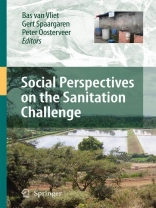This volume is the result of years of commitment with world-wide sanitation challenges from various research networks linking the editors and authors of this volume to many other sanitation scholars and professionals. Major contributions to this volume are derived from the work done in the PROVIDE project (working on sustainable urban infrastructures in cities of the Lake Victoria Basin, East Africa), the DESAR project (research and pilot projects in Decentralized Sanitation and Reuse, the Netherlands), and among others within NETSSAF (large scale implementation of sanitation in Africa), and Eco San networks. The major milestone for this book to emerge was however the IWA Sanitation Challenge Conference of May 2008 in Wageningen, the Netherlands where all the authors of this book presented their papers. The conference was organized by a consortium of sanitation specialists at Wageningen University’s Environmental Policy Group (the editors) and the s- department of Environmental Technology, Le AF (Lettinga Associates Foundation) and Wetsus (Center of Excellence for Sustainable Water Technology in the Netherlands). It was a unique event as it enabled a truly multi-disciplinary approach in discussing Sanitation Challenges in North and South with social and political scientists, natural scientists, environmental engineers and practitioners in one s- entific conference. This volume presents a selection of the social scientific insights and research results presented at the Sanitation Challenge Conference: the concepts, decisi- making support tools and the perspectives from farmers and consumers towards sanitation innovation.
Mục lục
Social Scientific Concepts of Provisioning Sanitation Services.- Meeting Social Challenges in Developing Sustainable Environmental Infrastructures in East African Cities.- Sense and Sanitation.- Providing Sanitation for the Urban Poor in Uganda.- Decision-Making Tools.- A Flowstream Approach for Sustainable Sanitation Systems.- A Learning and Decision Methodology for Drainage and Sanitation Improvement in Developing Cities.- Perceptions of Local Sustainability in Planning Sanitation Projects in West Africa.- Interactions Between Urban Forms and Source-Separating Sanitation Technologies.- Reconsidering Urban Sewer and Treatment Facilities in East Africa as Interplay of Flows, Networks and Spaces.- Meeting the Sanitation Challenge in Sub-Saharan Cities: Lessons Learnt from a Financial Perspective.- Perspectives from Farmers and End-Users.- Role of Farmers in Improving the Sustainability of Sanitation Systems.- Governing Peri-Urban Waste Water Used by Farmers: Implications for Design and Management.- End User Perspectives on the Transformation of Sanitary Systems.- Conclusion and Discussion.












